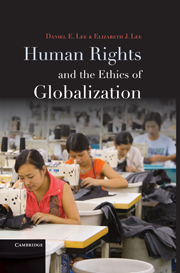Book contents
- Frontmatter
- Contents
- Preface
- Prologue
- Part I Philosophical Foundations
- 1 Defining Human Rights in a Coherent Manner
- 2 Near Neighbors, Distant Neighbors, and the Ethics of Globalization
- 3 Constructing an Ethic for Business in an Age of Globalization
- Part II Practical Applications
- Part III The Challenge of Enforcement
- Epilogue
- Select Bibliography
- Index
- References
1 - Defining Human Rights in a Coherent Manner
Published online by Cambridge University Press: 05 June 2012
- Frontmatter
- Contents
- Preface
- Prologue
- Part I Philosophical Foundations
- 1 Defining Human Rights in a Coherent Manner
- 2 Near Neighbors, Distant Neighbors, and the Ethics of Globalization
- 3 Constructing an Ethic for Business in an Age of Globalization
- Part II Practical Applications
- Part III The Challenge of Enforcement
- Epilogue
- Select Bibliography
- Index
- References
Summary
Whenever conversation turns to the ethics of globalization, it is not long before the language of human rights comes into play. It is, however, language fraught with ambiguity. If the language of human rights is to play a role in discussions of the ethics of globalization – and we believe that it should – it is essential that it be used in a careful manner, maintaining as much precision in definition as possible. To help set the context for this semantic discussion, we begin with a brief history of concepts of human rights.
Roots in Antiquity
Though the language of human rights was not widely used until after World War II, notions of what in time became known as human rights have roots in antiquity. Take, for example, the Ten Commandments, which appear in the Pentateuch (Torah) as part of the Mount Sinai story. As generations of Jewish and Christian school children who have been drilled until they can recite the Ten Commandments by heart know, they include prohibitions on killing, stealing, and coveting the property of others (Exodus 20.1–17). While they do not use the language of rights, the Ten Commandments can be interpreted as implying that people have certain basic rights, among them property rights and a right to live.
- Type
- Chapter
- Information
- Human Rights and the Ethics of Globalization , pp. 3 - 34Publisher: Cambridge University PressPrint publication year: 2010



